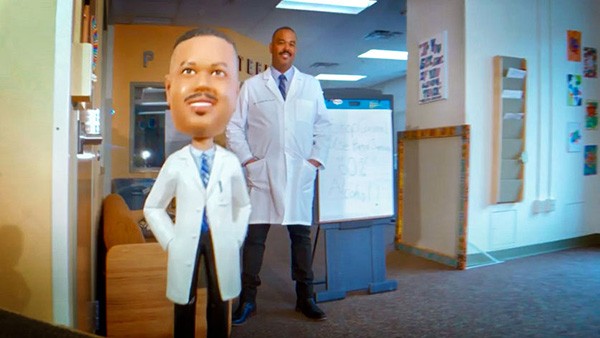Dr. John Clarke performs his rap “Stop Corona.”
Cornell Health physician educates youth through ‘health-hop’
By Melanie Lefkowitz
Dr. John Clarke started writing rap songs when he was 8 years old and never stopped.
Though he pursued a career in medicine rather than music, Clarke – director of occupational medicine at Cornell Health – still writes, produces and performs rap music on health-related topics. It’s a genre he calls “health-hop.”
His latest video, “Stop Corona,” aims to impart important information about coronavirus to communities of young people who might otherwise be hard to reach.
“For certain demographics, something like a rap video will resonate,” Clarke said. “And there’s a science behind why songs are effective for teaching. Rhythm and rhyme stimulate memory. Music stimulates several parts of the brain at the same time. So a lot of time it’s easier to remember songs than it is to remember just facts.”
With lyrics such as “Stop corona/don’t be a case/be careful who gets in your personal space/don’t touch your eyes, your nose or your face,” the 2-minute rap translates evidence-based science into rhyme.
“I first researched in-depth about the disease, how it spreads and the way it presents, so my message is consistent with what I would tell a patient as a doctor,” Clarke said. “In health-hop, you’re limited in the scope of words you can use to rhyme. It’s a challenge, but it’s a challenge I enjoy.”
While Clarke majored in music and sociology as an undergraduate at Columbia University, and was offered a recording deal when he was young, he was equally inspired by his father’s suggestion that he attend medical school. He first began creating health-hop around 20 years ago, as a doctor in Jamaica, Queens.
“We had a large population of asthmatics, many of whom were young. And a lot of their parents were young as well,” he said. “This was a culturally sensitive approach to delivering a health message. I created a rap song, we showed it at a high school, and it went really well. We showed that this is an effective way of appealing to that audience.”
Over the years, he’s created dozens of health-hop songs and videos, on topics ranging from teen smoking to melanoma to H1N1. In 2009, he won a contest sponsored by the U.S. Department of Health and Human Services for his “H1N1 Rap,” which rhymed “hand sanitizer” with “I advise ya” and became a public service announcement for swine flu safety.
Clarke and his family filmed the “Stop Corona” video in the Greater Ithaca Activities Center, where Clarke is a board member, just as New York state’s lockdown order was about to begin. His 14-year-old son, an aspiring rapper, helped write and perform the song, and his three younger children also appear in the video.
“Having someone their age be part of the message is a really good way to connect with that audience,” Clarke said.
About a week after filming the video, Clarke’s wife, a nurse practitioner who is the nursing director of the Intensive Cardiac Care Unit at Cayuga Medical Center, became worried because she hadn’t heard from her parents, Joseph and Sandra Clements. She drove to their apartment in New York City and found them in respiratory distress, ill with coronavirus. They were airlifted to Ithaca in hopes of receiving the medical care needed to overcome the virus, but died a short time later. Their deaths were the first two COVID-related fatalities in Tompkins County.
The “Stop Corona” video concludes with a dedication in their memory.
“I knew they would have wanted us to spread this message, and they would have been proud of their grandchildren,” Clarke said. “I’m a physician, my wife is a nurse practitioner, and even with our influence, they still became infected – they still ended up succumbing. So, it’s really critical that folks listen to preventive strategies – the quarantine, the handwashing, all of the things I outline in the video. Even if you’re not doing it to protect yourself, do it to help protect other more vulnerable members of the community whose immune systems may not be as strong.”
Tailoring his health messages to specific audiences is a communication skill Clarke also uses in his work at Cornell Health, where he advises a wide range of employees – including custodians, researchers and Cornell Health staff – about workplace safety.
“Usually when we talk about services at Cornell Health, we mean the services provided to students, but Dr. Clarke provides care for our own health care teams,” said Sharon McMullen, assistant vice president of student and campus life for health and well-being. “Our clinical team is now functioning under pandemic operations, and we have concerns about the well-being of our own staff. So we call upon Dr. Clarke to evaluate their health and safety in that setting, and provide recommendations. He provides a vital function, and we’re all grateful to him.”
Clarke said that in addition to helping educate and inform, rap music gives him a welcome creative outlet.
“I call it a balance to medicine,” he said. “In medicine you really don’t want to be too outside the box; in music, the more outside the box you are, the better.”
Media Contact
Get Cornell news delivered right to your inbox.
Subscribe

